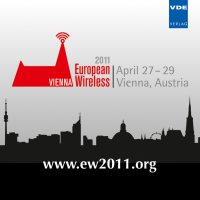Cognitive Beam Design and Transmit Power Control for Cognitive Radio Networks in Time-varying Channels
Conference: European Wireless 2011 - Sustainable Wireless Technologies
04/27/2011 - 04/29/2011 at Vienna, Austria
Proceedings: European Wireless 2011
Pages: 6Language: englishTyp: PDF
Personal VDE Members are entitled to a 10% discount on this title
Authors:
Yu, Heejung; Lee, Sok-kyu (Electronics and Telecommunication Research Institute (ETRI), Korea)
Abstract:
Cognitive beamforming is an attractive method for a secondary system to share the spectrum which originally allocated to a primary system with a constraint of interference temperature. If the perfect information about an interfering channel from a secondary transmitter to a primary receiver is available, the secondary interference at a primary receiver can be perfectly pre-nullified by choosing a transmit beam spanning in the null space of an interfering channel matrix. In practice, the perfect channel state information (CSI) is not available due to estimation error and temporal variation of channel. Especially, time-varying channel makes interference increasing monotonically ,with the transmission time. In this paper, the interference power which is a function of fading rate and transmission time is analyzed based on the Gauss-Markov channel model. By using this analysis, a transmit power control scheme for a secondary transmitter employing cognitive beamforming is proposed. Through numerical results, the analysis and performance of the proposed scheme are verified and evaluated.


